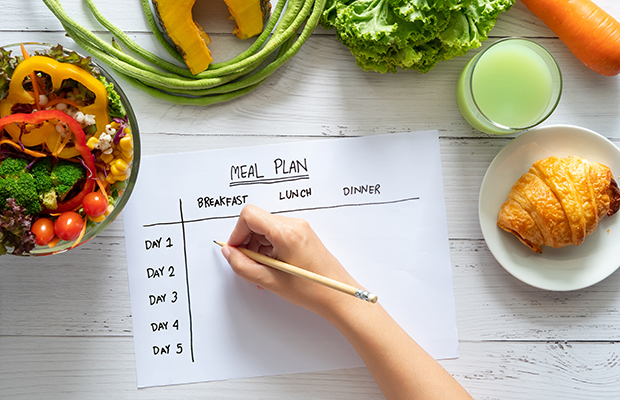Planning your diet doesn’t mean giving up your favorite foods or counting every calorie. It’s about creating a balanced way of eating that supports your health, energy levels, and mood. Whether your goal is to lose weight, feel more energetic, or simply eat better, this beginner-friendly guide will walk you through simple, practical steps to plan your daily meals — no nutrition degree required!
💡 Step 1: Understand the Basics of a Balanced Meal
One of the easiest ways to ensure you’re eating well is to understand what a balanced meal looks like. Think of your plate as a guide:
- 50% vegetables and fruits – These provide essential vitamins, minerals, antioxidants, and fiber. Choose seasonal and colorful varieties.
- 25% whole grains or complex carbohydrates – Such as rice, oats, millets, or whole wheat bread or roti. These give sustained energy without blood sugar spikes.
- 25% protein – Include a good source of protein in every meal. For vegetarians: dals, lentils, paneer, tofu. For non-vegetarians: eggs, chicken, or fish.
- A small portion of healthy fats – Fats are essential for hormone health and nutrient absorption. Include ghee, olive oil, nuts, seeds, or coconut.
This method keeps your meals simple, satisfying, and nutritionally complete.
🥡 Step 2: Follow a Routine
Irregular eating habits can affect digestion, energy, and metabolism. Following a consistent meal schedule helps regulate hunger hormones and supports your digestive system.
- Try eating every 3–4 hours: 3 balanced meals and 1–2 snacks.
- Drink a hydrating drink in the morning like lemon and honey in warm water, coconut water, or chia seeds water.
- Don’t skip meals, especially breakfast — it sets your metabolic tone for the day. Also, the breakfast should be savoury along with being high in proteins and fiber. Besan chilla with paneer, moong dal chilla with vegetables and coconut chutney, paneer paratha with greek yogurt, vegetable omellete with whole wheat toast, etc. are good options.
- Include any fruit in your mid-morning routine. Do not pair it with milk or tea.
- Lunch should be your biggest meal. Include cooked vegetables, dals, yoghurt, multi-grain roti or rice and some coriander chutney.
- Have a light, early dinner, ideally 2–3 hours before bedtime. Grilled paneer/ fish/ chicken, soups, and dals are great options.
Your body thrives on rhythm. Consistency supports better digestion and energy levels throughout the day.
🍽️ Step 3: Don’t Overthink Calories – Think Portions
Counting calories can be stressful and unsustainable. Instead, use portion control as a practical tool:
- Use your hand as a guide:
- Protein = palm size
- Carbs = cupped hand
- Vegetables = full hand
- Fats = thumb tip
This method helps you visually estimate how much to eat, supports mindful eating, and ensures you’re not overeating.
🥑 Step 4: Include All Food Groups Daily
Each food group has a unique role in keeping your body healthy. Ensure you get a mix of:
- Protein – Helps build and repair tissues. Include dals, legumes, tofu, paneer, milk, curd, or eggs.
- Carbs – Your main energy source. Choose whole grains like oats, rice, millet, or roti.
- Fats – Important for brain health and skin. Add nuts, seeds, ghee, or coconut.
- Fiber – Keeps your gut healthy. Comes from vegetables, fruits, and whole grains.
- Hydration – Drink at least 8–10 glasses of water a day. Herbal teas and infused water count too.
Skipping any food group can lead to nutritional gaps over time.
🛒 Step 5: Shop Smart & Meal Prep
Planning starts with having the right ingredients on hand. Here’s how to simplify it:
- Make a weekly grocery list based on what meals you plan to cook.
- Stock up on healthy pantry staples like oats, dal, rice, nut butters, and herbal teas.
- Pre-cut vegetables or cook some dals and grains in advance — store in the fridge for quick meals.
- Keep healthy snacks like roasted makhana, nuts, yogurt, or fruits easily accessible.
Meal prepping saves time, reduces food waste, and helps avoid last-minute unhealthy choices.
✅ Step 6: Small Changes That Make a Big Difference
You don’t have to revamp your whole diet overnight. Start with small, sustainable habits:
- Drink warm water with lemon or jeera in the morning.
- Replace fried snacks with roasted or steamed options.
- Swap high oil or high sugar foods with healthier options. Like sugar-laden desserts with fruit, dates, or jaggery-based sweets, fried items with grilled ones, etc.
- Cook with minimal oil and avoid reheating oils repeatedly.
- Practice mindful eating – chew slowly, eat without screens, and stop when you feel 80% full.
- Follow 80-20 rule which means 80% of the time eat healthy, home-cooked food and the rest 20% you can eat what you are craving to have.
Even one or two small changes can have a powerful ripple effect on your overall health.
🌟 Final Thoughts
Planning your diet is not about perfection — it’s about consistency, awareness, and balance. Start small. Build habits you can enjoy and sustain. Over time, you’ll see your health, energy, and relationship with food improve.

Akanksha Sharma
Dr. Akanksha Sharma, Head Writer and creator of AtoZ of Pregnancy, is dedicated to empowering women, parents, and families through 360-degree knowledge. She and her team provide evidence-based advice to guide families through pregnancy, parenting and beyond.






